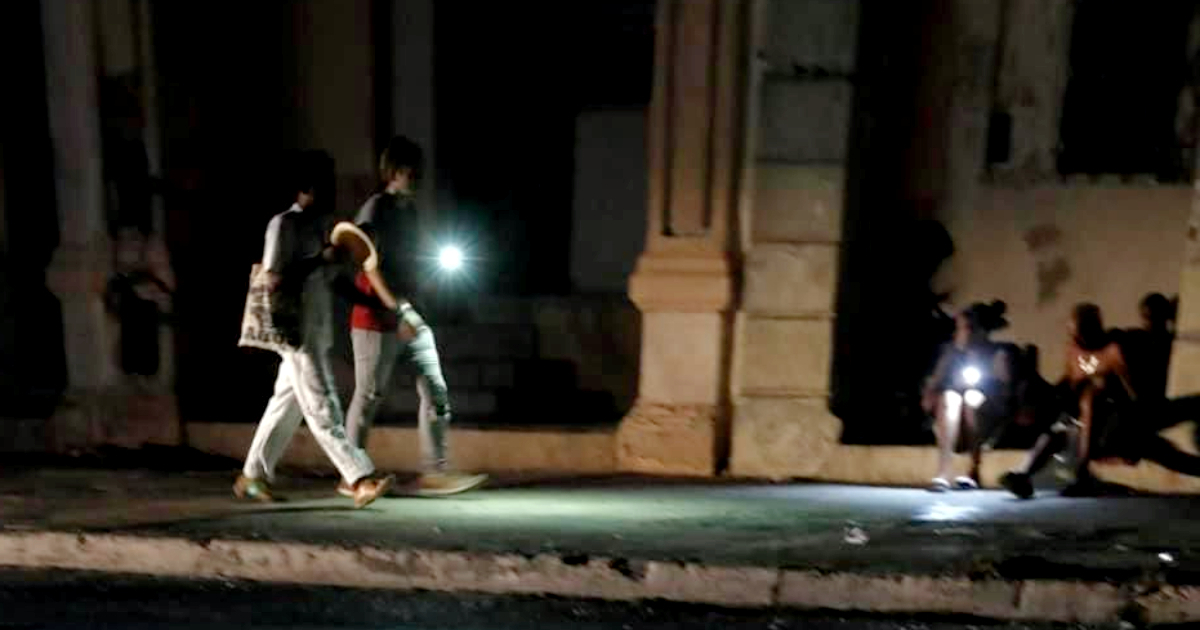
The discomfort caused by prolonged blackouts in Havana and other Cuban provinces continues to grow, according to user comments on a recent post by Unión Eléctrica (UNE) announcing the restoration of service in nearly half of the circuits.
Following the passage of Hurricane Rafael and the resulting damage to the country's already weakened electrical infrastructure, hundreds of thousands of residents in Havana are facing more than 72 hours without electricity, prompting a wave of complaints and reports on social media.
Although deemed a priority in restoring the electricity service, the Cuban capital continues to face critical issues, as noted by several internet users who vented their frustrations in the comments on UNE's social media.
A user expressed her frustration, stating that her area, at 23 and 42, had been without power for over 80 hours, with no fallen wires to explain the delay.
A resident of Arroyo Naranjo described how the food in their home is spoiling after four days without electricity, highlighting the desperation and helplessness in the face of a lack of answers.
Dissatisfaction also became evident outside the capital. One user remarked, "That's the only thing that matters to them, Havana, while the east is still suffering from blackouts."
The provinces furthest from the capital, such as Pinar del Río and Camagüey, have experienced up to 72 hours without service, a situation that another user described with skepticism: "If this is the situation in Havana, I can't imagine when they'll have service in Artemisa."
The complaints not only focus on the lack of electricity but also on the inadequate management and effective communication by the UNE.
From Playa Querejeta, a Cuban criticized the slow pace of repairs and recounted how food and essential products are being wasted due to the inability to preserve them without electricity.
A resident of Miramar warned (like many others) about the danger posed by fallen electricity poles in the wake of the hurricane. "A fallen tree is blocking the street, and the power lines are on the ground; I haven't seen a single truck working or assessing the situation," he reported.
Another recurring complaint is the inequality in the allocation of resources. One internet user emphasized, "This publication is disrespectful; only 48% and look at the amount of MW supplied in the capital, while other provinces are experiencing power outages of more than 14 hours a day." This perception of inequality has fostered a sense of neglect in communities that are farther from the capital.
For her part, another user mentioned how the vehicles from the UNE passed by without stopping after reporting an explosion in the electrical lines, and criticized that they only warned the neighbors to ensure that no one stole the cables because "there would be no replacements," disregarding the potential danger of the situation.
Next, CiberCuba presents a selection of comments left by users on the UNE's social media.
"If it is at 48% and there are 312 MW, Havana consumes nearly all the electricity in the country; no wonder we have to deal with blackouts every day."
"In Marianao, one and a half blocks without power, due to a fallen tree four days ago that has not yet been removed."
"Thanks to the capital, the rest of the country is sunk once again."
"We have been without power for over 72 hours, and the electrical wiring is exposed in the street. Only when someone gets hurt will they take action."
"The only thing they care about is Havana, while in Pinar del Río we have been without electricity for 72 hours and without any hope of reconnecting to the national grid."
"Havana alone consumes 700 MW. Imagine that in Cienfuegos, 50 MW is enough to power down almost everything."
"They need a power plant specifically just for them."
"Nuevo Vedado has been without service for almost 72 hours."
"In Centro Habana, they aren't pumping water; we have been without water for 5 days."
"Havana only experiences power outages of this magnitude due to weather-related situations; otherwise, not even in dreams."
Protests in the capital of Cuba
Protests against the prolonged blackouts in Cuba have intensified in recent weeks, with loud demonstrations and gatherings in various neighborhoods of Havana.
This Friday, residents of Nuevo Vedado held a protest characterized by the sound of pots and slogans demanding the restoration of electric service after more than 72 hours without power.
In another part of the capital, residents of Guanabacoa also raised their voices in a pot-banging demonstration that highlighted the widespread frustration.
Citizens, facing power outages that severely affect their quality of life, used this form of protest to highlight their situation and demand immediate solutions.
The protests in both places highlight the critical situation facing the country's electrical infrastructure and the authorities' inability to restore service within a reasonable time frame.
This discontent has spread to other areas of the island, where prolonged outages and a lack of effective communication from UNE foster a sense of abandonment and despair.
Peaceful demonstrations and the use of pots and pans as a symbol of protest reflect the resilience of Cubans in the face of an ongoing energy crisis that continues to lack clear solutions.
The increase in these actions shows that Cubans are losing patience and, in many cases, are facing potential repercussions to assert their right to decent living conditions.
What do you think?
COMMENTFiled under: